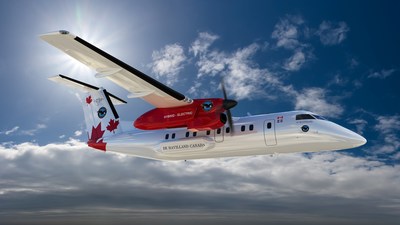Source: Pratt & Whitney Canada
“Pratt & Whitney Canada is proud to be a leader toward ever more sustainable aircraft propulsion technologies and be an integral part of Canada’s green recovery plan,” said Maria Della Posta, president, Pratt & Whitney Canada. “With a long-time commitment to sustainability and as Canada’s top aerospace investor in research & development, having invested $500M CAD annually, we are driving economic growth, innovation and workforce expertise to benefit the environment. Hybrid-electric technology has an important role to play in enabling the next step-change in efficiency for aircraft engines, and we are uniquely positioned to demonstrate this potential.”
The new hybrid-electric propulsion technology will drive significant improvements in aircraft efficiency by optimizing performance across the different phases of flight, allowing the demonstrator to target a 30% reduction in fuel burn and CO2 emissions, compared to a modern regional turboprop airliner. P&WC is working with De Havilland Aircraft of Canada Limited (De Havilland Canada) to integrate this hybrid-electric technology into a De Havilland Canada Dash 8-100 flight demonstrator. This demonstrator will include an advanced electric motor and controller from Collins Aerospace, also a Raytheon Technologies business.
As part of Canada’s green recovery plan, the Government of Canada’s Strategic Innovation Fund is backing the technology demonstrator, which will help put Canada’s aerospace industry at the forefront of global efforts to make aviation more sustainable. The Provincial Government of Quebec is also supporting this project through Investment Québec and the Provincial Ministry of Economy and Innovation of that Canadian province, as part of an initiative known as Green and Digital Aircraft of Tomorrow.
Combining advanced technologies developed by P&WC and Collins, this project is a successor to Project 804, launched in 2019 as a joint development program between the two companies and provides a solid foundation for this new demonstrator program to build upon. P&WC will target ground testing in 2022, leading to flight testing of the Dash 8-100 demonstrator in 2024.
Developing hybrid-electric propulsion technology is a core element of Pratt & Whitney’s strategy to make aviation more sustainable. The company is also committed to continually advancing the efficiency of gas turbine engines across its portfolio, while supporting the wider use of sustainable aviation fuels, and pursuing alternative fuels. All these elements will be critical for the aviation industry to meet its goals to significantly reduce CO2 emissions by 2050. The company will continue to work with industry partners globally on a wide variety of projects targeted at increasingly sustainable aviation to benefit our customers and the environment.
The company supports the industry’s efforts to coordinate and accelerate the development of green aviation technologies in Canada, bringing together stakeholders from the Canadian aerospace ecosystem, from supply chain to academia to government organizations. This will help ensure Canada’s aerospace sector is in a strong position to play a leading role in the global drive to innovate new, low carbon technologies.
“Canada has an opportunity to demonstrate environmental leadership in the aviation sector,” said Dave Riggs, Chief Transformation Officer, De Havilland Canada. “De Havilland Canada has a legacy of innovation that has supported aviation in Canada and around the world for more than 90 years and we are immensely proud to be the first manufacturer of regional aircraft supporting the development of hybrid-electric propulsion technology. We look forward to collaborating with Pratt & Whitney Canada and governments in Canada to further the development of alternative, climate-friendly technology that holds much potential to contribute to more sustainable aviation.”
“The aerospace sector is a pillar of the Canadian economy, providing good jobs for Canadian workers from coast to coast to coast. It’s essential that we support the long-term growth of the sector and help make Canada a world leader in greener, more innovative technologies. The investments announced today will help the aerospace sector increase its research and development efforts so that innovative, greener, more sustainable aircraft can be built right here in Canada for decades to come, creating good jobs for hard-working Canadians,” states the Honourable François-Philippe Champagne, Canadian Federal Minister of Innovation, Science and Industry.
“These are major projects that will drive Quebec into the future! We will develop tomorrow’s helicopters and airplanes today, in Quebec. These aircraft will contribute to the economy, while reducing CO2 emissions. The aerospace industry will relaunch with vigor. Your government will be there to reinforce our leadership and ensure a strong future for Quebec’s aerospace industry,” says François Legault, Provincial Premier of Quebec.

